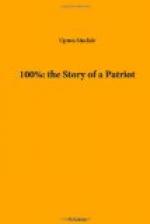These were busy times just now. In spite of the whippings and the lynchings and the jailings—or perhaps because of these very things—the radical movement was seething. The I. W. Ws. had reorganized secretly, and were accumulating a defense fund for their prisoners; also, the Socialists of all shades of red and pink were busy, and the labor men had never ceased their agitation over the Goober case. Just now they were redoubling their activities, because Mrs. Goober was being tried for her life. Over in Russia a mob of Anarchists had made a demonstration in front of the American Legation, because of the mistreatment of a man they called “Guba.” At any rate, that was the way the news came over the cables, and the news-distributing associations of the country had been so successful in keeping the Goober case from becoming known that the editors of the New York papers really did not know any better, and printed the name as it came, “Guba!” which of course gave the radicals a fine chance to laugh at them, and say, how much they cared about labor!
The extreme Reds seemed to have everything their own way in Russia. Late in the fall they overthrew the Russian government, and took control of the country, and proceeded to make peace with Germany; which put the Allies in a frightful predicament, and introduced a new word into the popular vocabulary, the dread word “Bolshevik.” After that, if a man suggested municipal ownership of ice-wagons, all you had to do was to call him a “Bolshevik” and he was done for.
However, the extremists replied to this campaign of abuse by taking up the name and wearing it as a badge. The Socialist local of American City adopted amid a storm of applause a resolution to call itself the “Bolshevik local,” and the “left-wingers” had everything their own way for a time. The leader in this wing was a man named Herbert Ashton, editor of the American City “Clarion,” the party’s paper. A newspaper-man, lean, sallow, and incredibly bitter, Ashton apparently had spent all his life studying the intrigues of international capital, and one never heard an argument advanced that he was not ready with an answer. He saw the war as a struggle between the old established commercialism of Great Britain, whose government he described as “a gigantic trading corporation,” and the newly arisen and more aggressive commercialism of Germany.
Ashton would take the formulas of the war propagandists and treat them as a terrier treats a rat. So this was a war for democracy! The bankers of Paris had for the last twenty years been subsidizing the Russian Tsars, who had shipped a hundred thousand exiles to Siberia to make the world safe for democracy! The British Empire also had gone to war for democracy—first in Ireland, then in India and Egypt, then in the Whitechapel slums! No, said Ashton, the workers were not to be fooled with such bunk. Wall Street had loaned some billions of dollars to the Allied bankers, and now the American people were asked to shed their blood to make the world safe for those loans!




